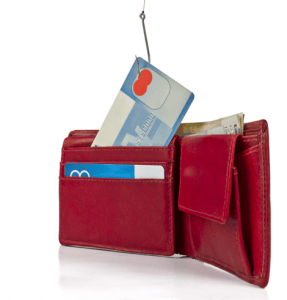Credit Card Cost
 Credit Card Cost: a reader asks…
Credit Card Cost: a reader asks…
This might not be a true tech question but I’ll ask it anyway. My credit card was stolen recently and my bank cancelled the stolen card and sent me a new one right away. I didn’t have to pay for whatever the card was used for, nor for my new credit card. So who’s stuck paying for those costs?
Collectively, us consumers. The way this works is that your bank (or any credit card issuing company) is in business to make money. They extend you credit for it, and may charge you a nominal fee (or not-so-nominal) annually for the service. They also charge every merchant for the privilege of accepting credit cards, as well as a percentage of every sale. If you carry a balance on your credit card, they also charge you finance fees for carrying that balance.
 A few years ago, a lot of noise was made about changing the onus on paying for fraudulent use from the banks to merchants. This would affect any merchant who did not switch to the new chip card readers. However, there were a number of exceptions (like gas stations) who still aren’t stuck with the cost of fraudulent purchases. Most other merchants have made this switch, so ostensibly the banks are still paying for the overall cost of credit card fraud. Including the cost of administering the replacement of stolen cards and all the other administrative stuff that goes with it.
A few years ago, a lot of noise was made about changing the onus on paying for fraudulent use from the banks to merchants. This would affect any merchant who did not switch to the new chip card readers. However, there were a number of exceptions (like gas stations) who still aren’t stuck with the cost of fraudulent purchases. Most other merchants have made this switch, so ostensibly the banks are still paying for the overall cost of credit card fraud. Including the cost of administering the replacement of stolen cards and all the other administrative stuff that goes with it.
Think the banks are just declaring a lower profit? Never! The truth is that all that fraud is a cost that’s simply passed along to us, the consumers by way of higher prices for the goods and services we buy. Retailers have to make a profit too, as well as distributors, shippers, manufacturers and raw material producers. Everybody gets their costs covered, and varying levels of profit. All that comes down to the price we pay for what we buy.
 It’s easy to get caught up in the ‘sale price’, 2-for-1, limited time offers, and other gimmicks the marketing industry has come up with to make us think we’re saving money. The reality is that we aren’t. Everybody in business is in business to make money – money that ultimately comes out of our own pockets. The more successful a business is at this, the more of our money goes into their velvet-lined pockets, regardless of the true value of what’s being sold.
It’s easy to get caught up in the ‘sale price’, 2-for-1, limited time offers, and other gimmicks the marketing industry has come up with to make us think we’re saving money. The reality is that we aren’t. Everybody in business is in business to make money – money that ultimately comes out of our own pockets. The more successful a business is at this, the more of our money goes into their velvet-lined pockets, regardless of the true value of what’s being sold.
Marketing professionals have been so good at it that most people have no idea how the system really works. So we tend to downplay our own role in preventing fraud, leaving that up to ‘someone else’. The result is that a particular item might cost less than a dollar in raw materials, less than another dollar to make, and less than another dollar to get it into your hands. While you might add this up to a cost of less than three dollars, you’d never know this – the price you pay will be anywhere from 1/3 more to 10 times that cost or more.
The value of a thing is what someone will pay for it
This old saw is still true. Today many folks think nothing of dropping a thousand dollars or more for a smartphone, or paying hundreds of dollars a month for basic utilities, or borrowing hundreds of thousands of dollars to get a nice house. What we actually pay is whatever the seller can convince us to pay for it, regardless of any other value equation. So it’s still ‘buyer beware’ everywhere, and recognize that we are all paying all the costs of fraud – collectively.
This website runs on a patronage model. If you find my answers of value, please consider supporting me by sending any dollar amount via:
or by mailing a check/cash to PosiTek.net LLC 1934 Old Gallows Road, Suite 350, Tysons Corner VA 22182. I am not a non-profit, but your support helps me to continue delivering advice and consumer technology support to the public. Thanks!






